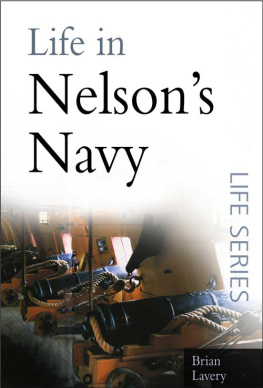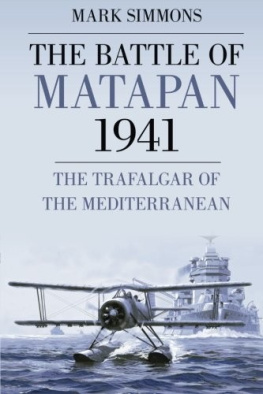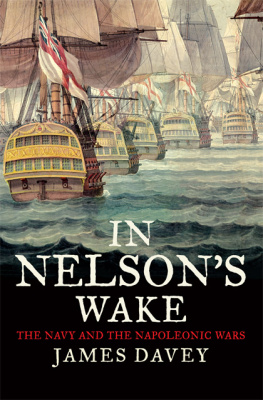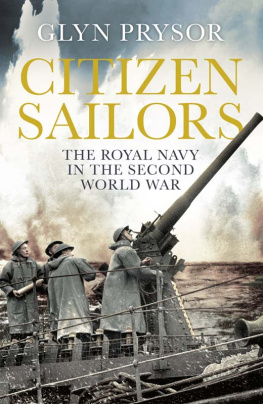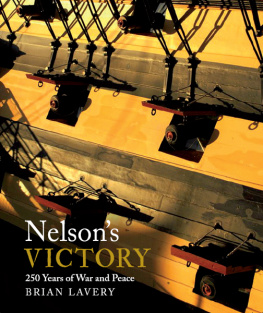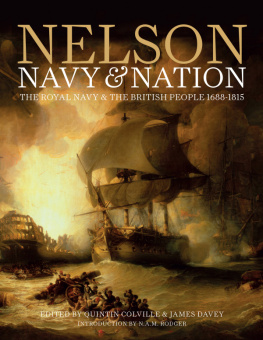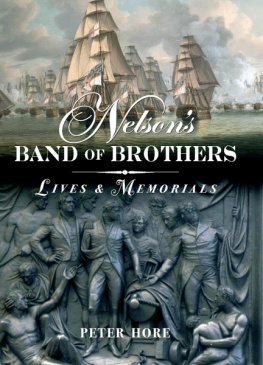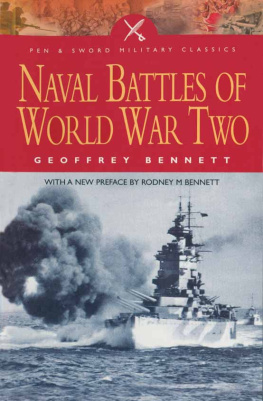NELSON THE COMMANDER
Geoffrey Bennett
Geoffrey Bennett 2013
Geoffrey Bennett has asserted his rights under the Copyright, Design and Patents Act, 2001, to be identified as the author of this work.
First published in 1972 by B.T. Batsford Ltd.
This edition published in 2013 by Endeavour Press Ltd.
To the PAST OVERSEERS SOCIETY OF ST MARGARET AND ST JOHN, WESTMINSTER, which had inherited from the erstwhile St Margaret's Vestry Club, the tradition that, whilst enjoying a whitebait dinner at Greenwich in 1805, its members received the news of Nelson's death and immediately rose and in silence drank a toast to THE IMMORTAL MEMORY.
This tradition has since been honoured each year by the Society at its annual dinner before the ceremony of transferring their unique and famous Tobacco Box to its Custodians of the ensuing year, of which the original component was acquired in 1713, and on which the year 1798 is commemorated by a representation of the battle of the Nile and the year 1805 by a portrait of Lord Nelson
Contents
Acknowledgements
To Her Majesty The Queen, for gracious permission to quote from papers in the Royal Archives, Windsor, the author submits his humble thanks.
My second debt is to my wife whose advice and help throughout the writing of this book have been of incalculable value. Without her wise guidance on Nelson's relations with his wife and with Emma Hamilton from the female viewpoint I should have been 'all at sea'.
My third is to Dr. J. E. de Courcy Ireland whose encyclopaedic knowledge and objective understanding of maritime history have done so much to enable me to deal with my subject 'warts and all'; and to Captain W. R. H. Lapper, Royal Navy, who by likewise reading this book in typescript, has steered me clear of many a shoal. Neither is, however, to be held responsible for any errors in my navigation.
My fourth, but by no means least, is to Admiral of the Fleet Sir Peter Hill-Norton, G.C.B. for allowing me to use the greater part of his speech delivered in Washington, D.C., on Trafalgar Day, 1970, as a singularly apposite Foreword.
Others to whom I am indebted include Mr. R. C. Mackworth-Young, Assistant Keeper of the Royal Archives and his staff at Windsor; Captain E. Borg, Royal Danish Navy, for an invaluable visit to Copenhagen; Commander L. T. Kuzmin, Assistant Naval Attach to the Embassy of the U.S.S.R. in London, who enabled me to use the papers of Admiral Ushakov; Mr. Douglas Robinson, M.D., of Pennington, New Jersey; Lieutenant-Commander W. E. Pearce, Royal Navy, Captain of HMS Victory (Ship) for a most illuminating visit to his command; the Director of the Central Maritime Museum, Leningrad; Mr. A. W. H. Pearsall and the staff of the National Maritime Museum, Greenwich ; and the Librarians of the City of Westminster and the Royal Borough of Kensington and Chelsea and their staffs, in particular for the speed with which they obtained such books as I needed from abroad.
For permission to use copyright material I have to thank Miss Carola Oman for a short extract from her Nelson , and J. M. Dent & Son for a quotation from The Mirror of the Sea by Joseph Conrad.
I have also to thank Mr. P. S. Roland for translating Russian documents; Miss Mary Rundle for compiling the index; Mr Arthur Banks for drawing the admirable maps and diagrams, and Miss Adrienne Edye for untiringly typing and retyping my often illegible manuscript.
Lastly, I acknowledge my debt to all those who have 'charted the way', the authors and editors of the many books already published dealing directly and indirectly with Nelson's life and career which are listed in my Bibliography.
Postscript
According to p. 2, 'the Victory , alone of all the great armada of warships which have flown the British ensign, is preserved in Portsmouth dockyard'. By a happy chance, this statement has been proved wrong whilst the book was with the printers; by the unexpected decision taken in the summer of 1971, to preserve for posterity in a Thames-side berth opposite the Tower of London, the last and largest of Britain's World War Two cruisers, HMS Belfast , 11,550 tons, completed in 1939 with twelve 6-inch guns.
Foreword
By Admiral of the Fleet Sir Peter Hill-Norton, G.C.B.,
British Chief of the Defence Staff
From a speech delivered in Washington , D . C .,
on Trafalgar Night , October 1970
Admiral Elmo Zumwalt, Gentlemen.... This is a unique occasion; the first time that any First Sea Lord has had the honour of entertaining the Chief of Naval Operations and his officers in their own capital city, to commemorate a British sailor who had his baptism of fire in the War of American Independence.
Your Navy shares with ours many traditions which have led to a mutual respect and understanding, and to a unique relationship of outstanding importance to the Free World. In 1782, when captain of the frigate Albemarle , Nelson captured an American fishing schooner, the Harmony of Massachussetts, whose skipper and owner, Nathaniel Carver, had almost reached port with a cargo representing all his worldly possessions. Ordered to pilot the Albermarle into Boston, Carver did so with such speed and skill that Nelson, saying that it was not the custom of English seamen to be ungrateful, returned his schooner to him and gave him a certificate of good conduct. Two months later, Carver by chance came across the Albemarle still on patrol, with her crew suffering badly from scurvy, and presented Nelson with four sheep, several crates of fowls and a large quantity of fresh vegetables. It would be difficult to find a better example of mutual respect and understanding.
We speak almost the same language, and our Services are governed in what they do and how they do it by long established tradition, which has its origin in professional integrity, courage, skill and diligence. And Lord Nelson had these qualities to a degree that no British sailor before or since has been able to equal: he is an example of what we should all like to be, and what from an early age we are taught to try and live up to. Your Navy also has its heroes, and we admire the superb seamanship, courage and fighting qualities of the American captains in the classic single ship actions of the War of 1812. Bainbridge of the Constitution , Dekatur of the United States , Lawrence of the Hornet and the Chesapeake , all have an honoured place in both American and British naval history.
It is a widely held fallacy that to look back on the past is not only unprofitable but a sign of decadence. Nothing could be further from the truth; none of us should make the mistake of thinking that we have nothing to learn from history or its great men. The Royal Navy looks back with pride on what Nelson did for his country, but not because what we were doing at that time was necessarily right, nor because we are filled with nostalgia for our imperial past. We look back at the standards of conduct and the sense of purpose and duty of this small frail man, so that they may serve as an inspiration to us and our successors. These are sentiments which, in the context of your own great men, I am sure you share.
Today, it is the mode to denigrate the fighting Services, and with them the virtues of integrity and industry, skill and enterprise, courage and perseverance, without which we should have no purpose and could not hope to survive in a materialistic age. The remedy is in our own hands: it is for us to ensure that by our own conduct and example, the Profession of Arms, and particularly the Naval Service, continues to be recognized as an honourable, difficult and worthwhile vocation.
Nelson did it; let us, each in his own way, seek to rise to his standards. Gentlemen, I give you the toast : 'The Immortal Memory'.
I Dialectic
Horatio Nelson, Vice-Admiral of the White, Knight of the Bath, Baron and Viscount of the Nile and of Burnham Thorpe and Hilborough in the County of Norfolk, Duke of Bront - plus the posthumous bestowal (on his elder brother, William) of an earldom and the viscountcy of Trafalgar and Merton. His death 'was felt in England as something more than a public calamity... [so] deeply we loved and revered him.... The country had lost... its great naval hero.... So perfectly had he performed his part, that the maritime war, after the battle of Trafalgar, was considered at an end: the fleets of the enemy were not merely defeated, but destroyed... through Nelson's surpassing genius. He could scarcely have departed in a brighter blaze of glory. He has left us... a name which is our pride, and an example which will continue to be our shield and strength.'
Next page

